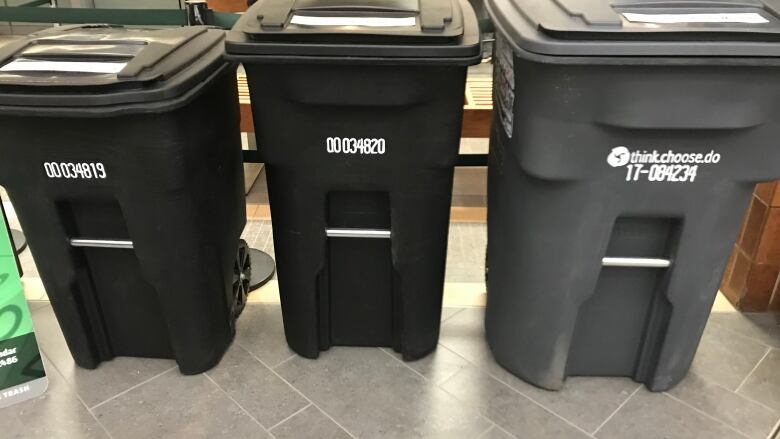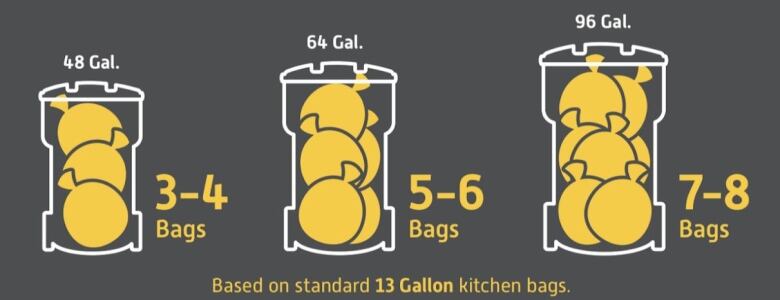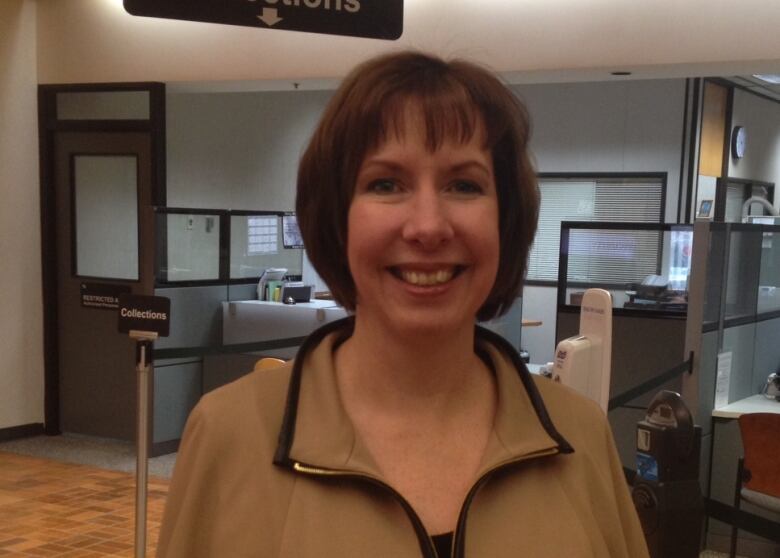'Let's slow down': Council puts off decision on pay-as-you-throw for a month
Council will pick up the discussion in October

After hours of questions for city planners, Saskatoon city councillors decided to hold off a vote on the future cost of garbage and compost collection for residents.
The group was expected to decide the fate of the proposed pay-as-you-throw (PAYT) system, in which residents would pay a monthly fee roughly based on the size of their trash bin.
But as the discussion wore on, councillors began to push back against the idea that they needed to make a decision Monday night. The final decision is now slated for some time in October.
"There's absolutely no rush on this. Let's slow down," said councillor Troy Davies.
PAYT would replace the current practice of covering the cost of waste services through property taxes. Those services are currently underfunded by $5 million a year, due in part to a shortfall in landfIll revenues, causing the city to dip into its reserves.
The city hopes the new system will fully cover the cost of garbage collection, help Saskatoon reach its goal of diverting 70 per cent of its waste from the landfill by 2023 and eliminate the need to replace the city dump at an estimated cost of $120 million.
Councillors want the city to report back on a number of things, including whether one part of the PAYT package green bins and mandatory curbside composting could be covered through property taxes instead of the monthly all-in-one pickup fees eyed by the city.
Some councillors said they were prepared to vote Monday night without that information, however.
"I think we need to act," councillorMairin Loewen of the funding shortfall.
Exact pricing of bins TBD
Under PAYT, residents would choose between three garbage bins of different sizes, with estimated monthly usage fees as low as $18 and as high as $36.20.
City councillors said they want the city's final suggested pricing scheme before making decisions on the wider system.

Ward 3 councillor AnnIwanchuksaid she hasn't heard "one positive comment from anyone in my ward" about the proposed plan.
She said residents in her ward took the name "pay-as-you-throw" at face value.
"They thought it meant pay-as-you-throw a tipping program where you only pay if you put your garbage out," Iwanchuk said.
Another issue identified byIwanchukand her constituents is the "break-even point" for the new utility the point where a homeowner would be paying the same amount for the utility as they did when it was included in their property tax.
"If you have a $700,000 home you would be paying the same with the proposal with the smallest bin, not the largest bin," saidIwanchuk.

"I don't have many people who have $700,000 homes in Ward 3. They'd be paying quadruple what they're paying now."
Homes in Ward 3 are often situated on small, 25-foot lots, andIwanchuksaidthere's no room for three bins, as the city administration has proposed.
More than one councillor asked why the city is not proposing to move to a Pay As You Tip system, in which garbage is charged by weight or volume.
A city staffer said that would be very difficult to do on a tight timeline, but that the city hopes to move toward model in the future.
Moving to bi-weekly collection
The city is hopeful 60 per cent of residents will immediately switch to the smallest of the three bins.
Councillors also put off a vote to move garbage collection to a bi-weekly schedule.
Because of concerns about smelly garbage buildup during the summer, some councillors called for garbage to be picked up on a weekly basis from June to September.
Provided it's approved next month, the new schedule won't take effect until spring 2020.
The city estimates it will cost $13.5 million to launch PAYT, partly due to the cost of some new city positions.
With files from Bridget Yard












_(720p).jpg)


 OFFICIAL HD MUSIC VIDEO.jpg)
.jpg)



























































































